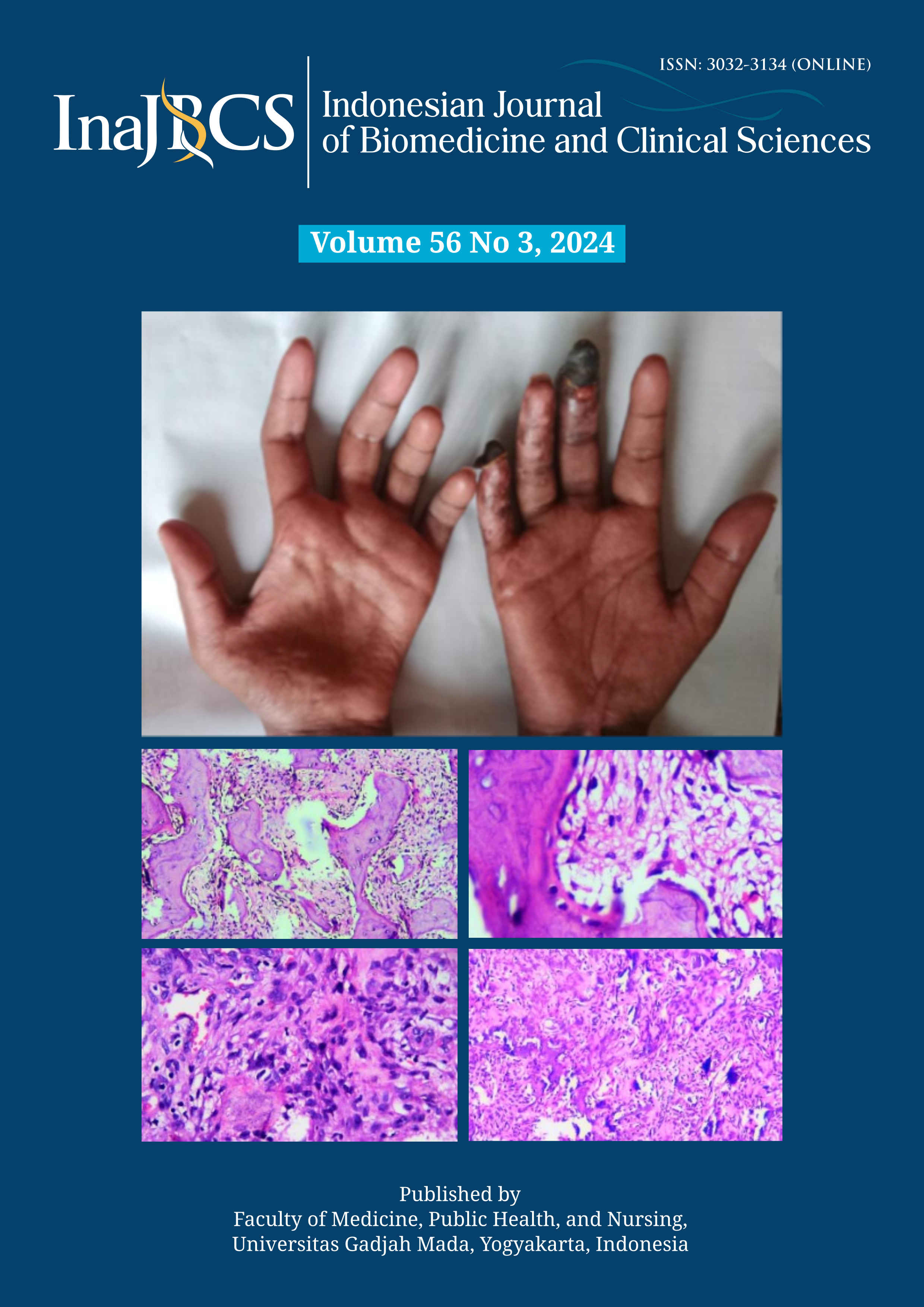Characteristics, management, and major adverse cardiac events of ST-elevation myocardial infarction (STEMI) patients in rural area: a Jember acute coronary syndrome medical records study
Abstract
The mortality and morbidity of ST-elevation myocardial infarction (STEMI) remain high, and it is still the leading cause of death worldwide. Timely reperfusion lowers the risk of MACE and improves survival. However, reperfusion delay is still a significant issue in developing countries, particularly rural area. This study aimed to determine the characteristics, management, and major adverse cardiac events of STEMI patients in Jember Distric to enhance reperfusion therapy in rural areas. It was an analytical observational cross-sectional study with a quantitative method. A total of 108 medical records of STEMI patients of the Dr. Soebandi District Hospital, Jember in period of 2019 to 2020 were included using the consecutive sampling technique. As much as 78 (62%) of the patients did not receive reperfusion therapy while the remaining patients (41 or 38%) received the therapy, namely percutaneous coronary intervention (20 or 18.5%), fibrinolytic therapy (19 or 17.6%), and both (2 or 1.9%). Multivariate analysis for reperfusion was statistically significant (p=0.016; OR 3.688 95% CI: 1.274-10.679). The level of education, health funding, and distance to the hospital did not affect the delay of the reperfusion therapy. Reperfusion was highly associated with the incidence of MACE and this study discovered a threefold benefit of reperfusion in lowering the occurrence of MACE (p=0.016). In conclusion, the majority of STEMI patients does not get reperfusion therapy. Delays in reperfusion treatment are not related to the patient's level of education, health funding, or distance to the hospital. Nonetheless, the delay my be attributed to the Jember community's lack of awareness of STEMI symptoms.
References
World Health Organization. Cardiovascular Diseases (CVDs). World Health Organization 11 June 2021. Available from: https://www.who.int/news-room/fact-sheets/detail/cardiovascular-diseases-(cvds)
Badan Penelitian dan Pengembangan Kesehatan. Laporan Nasional Riset Kesehatan Dasar 2018. Jakarta: Kementerian Kesehatan Republik Indonesia, 2018.
Bambari HA, Agnes LP, Joseph VFF. Terapi reperfusi pada infark miokard dengan ST-Elevasi. e-CliniC 2021; 9(2):287-98.
https://doi.org/10.35790/ecl.9.2.2021.32850
Bosco E, Hsueh L, McConeghy KW, Gravenstein S, Saade E. Major adverse cardiovascular event definitions used in observational analysis of administrative databases: a systematic review. BMC Med Res Methodol 2021; 21(1):241.
https://doi.org/10.1186/s12874-021-01440-5
Yang Y, Hao Y, Liu J, Yang N, Hu D, Sun Z, et al. Practice of reperfusion in patients with ST-segment elevation myocardial infarction in China: findings from the Improving Care for Cardiovascular Disease in China-Acute Coronary Syndrome project. Chin Med J (Engl) 2022; 135(23):2821-8.
https://10.1097/CM9.0000000000002257
Nasution SA, Hendra P, Eka G, Ikhwan R. In-hospital major adverse cardiac events factor predictors on ST-Elevation myocardial infarction after primary percutaneous coronary intervention at Dr. Cipto Mangunkusumo General Hospital. eJKI 2022; 10:(2):107-113.
https://doi.org/10.23886/ejki.10.193.107-13
Bohula EA, Morrow DA. ST elevation myocardial infarction: management. In: Zipes D, Libby P, Bonow R, Mann D, Tomaselli G, Braunwald E, editors. Braunwald’s Heart Disease: a Textbook of Cardiovascular Medicine (11th ed). Philadelphia: Elsevier Inc, 2020; p 1123-80.
Vogel B, Claessen BE, Arnold SV, Chan D, Cohen DJ, Giannitsis E, et al. ST-segment elevation myocardial infarction. Nat Rev Dis Primers 2019; 5(1):39.
https://doi.org/10.1038/s41572-019-0090-3
Parung AA, Liben P, Herwanto B. Tingkat mortalitas terapi reperfusi pada penderita STEMI di RSUD Dr. Soetomo Surabaya. JUXTA J Ilm Mhs Kedokt Univ Airlangga 2016; 8:17-23.
Thygesen K, Alpert JS, Jaffe AS, Chaitman BR, Bax JJ, Morrow DA, et al. Fourth universal definition of myocardial infarction (2018). J Am Coll Cardiol 2018; 72(18):2231-64.
https://doi.org/10.1016/j.jacc.2018.08.1038
Huber K, De Caterina R, Kristensen SD, Verheugt FWA, Montalescot G, Maestro LB, et al. Pre-hospital reperfusion therapy: a strategy to improve therapeutic outcome in patients with ST-elevation myocardial infarction. Eur Heart J 2005; 26(19):2063-74.
https://doi.org/10.1093/eurheartj/ehi413
Hendrawati, Rohman MS, Tjahjono CT, Widito S, Satrijo B, Waranugraha Y, et al. Percutaneous coronary intervention in ST-segment elevation myocardial infarction: late is better than not done at all. Heart Sci J 2020; 1(3):21-6.
https://doi.org/10.21776/ub.hsj.2020.001.03.5
Novrianti I, Dhani W, Faizal M, Sari W. Pharmacological therapy for ST-Segment elevation myocardial infarction: a review. J Islamic Pharm 2020; 5(2):9-13.
Wong GC, Welsford M, Ainsworth C, Abuzeid W, Fordyce CB, Greene J, et al. 2019 Canadian Cardiovascular Society/Canadian Association of Interventional Cardiology Guidelines on the acute management of ST-elevation myocar-dial infarction: focused update on regionalization and reperfusion. Can J Cardiol 2019; 35(2):107-32.
https://doi.org/10.1016/j.cjca.2018.11.031
Yang HT, Xiu WJ, Zheng YY, Liu F, Gao Y, Ma X, et al. Invasive reperfusion after 12 hours of the symptom onset remains beneficial in patients with ST-segment elevation myocardial infarction: evidence from a meta-analysis of published data. Cardiol J 2019; 26(4):333-42.
https://doi.org/10.5603/CJ.a2018.0034
Guo Q, Jinyu H, Yong S, Guoxin T, Li H, Shasha M. The role of late reperfusion in ST-segment elevation myocardial infarction: a real-world retrospective cohort study. BMC Cardiovas Disord 2020; 20(1):207.






